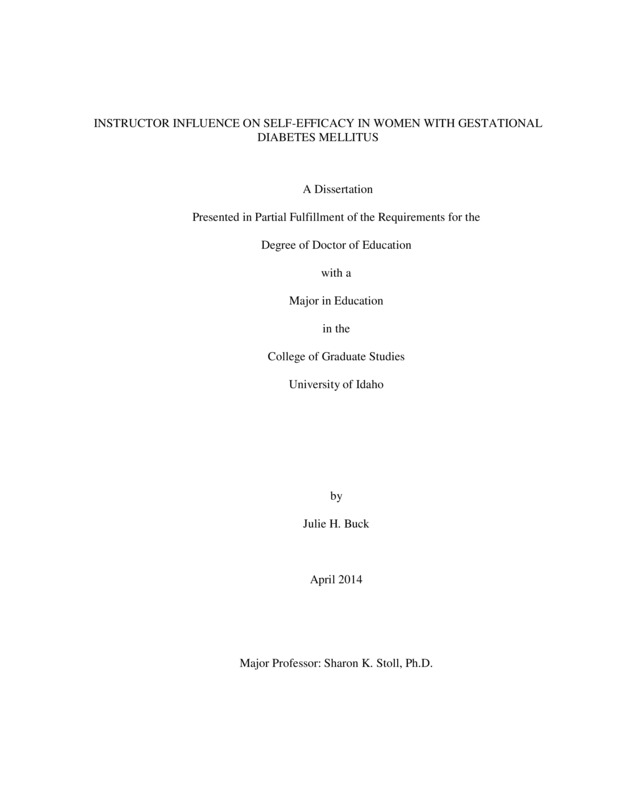Instructor Influence on Self-Efficacy in Women with Gestational Diabetes Mellitus
Buck, Julie Harker. (2014). Instructor Influence on Self-Efficacy in Women with Gestational Diabetes Mellitus. Theses and Dissertations Collection, University of Idaho Library Digital Collections. https://www.lib.uidaho.edu/digital/etd/items/buck_idaho_0089e_10314.html
- Title:
- Instructor Influence on Self-Efficacy in Women with Gestational Diabetes Mellitus
- Author:
- Buck, Julie Harker
- Date:
- 2014
- Keywords:
- Diabetes Experiential Learning Gestational Diabetes Mellitus Instructor Influence Pregnancy Self-Efficacy
- Program:
- Curriculum & Instruction
- Subject Category:
- Health education; Adult education; Higher education
- Abstract:
-
Gestational diabetes mellitus (GDM) develops during pregnancy with national occurrence rates of approximately 7.5% of pregnant women or about 88% of all cases of diabetes in pregnancy (Buchanan & Xiang, 2005). Adverse outcomes associated with GDM create higher medical costs for prenatal care, labor and delivery of baby, and extended postpartum recovery. Education, using experiential learning, for proper self-care practices of meal management and blood sugar monitoring is a vital component of GDM treatment. The first study included selection of pregnant women with GDM occurred during a five month period of time in three southeast Idaho locations, which resulted in 12 participants. The 18-item Diabetes Self-Efficacy Scale (DSES) developed by Hurley & Shea (1992) was used, with three additional question added to assess teacher influence and number of visits for diabetes education. Although no significance was shown among responses, an increasing trend occurred in certainty of perceived ability to perform diabetes self-care practices in all areas except exercise. The two descriptive questions to describe instructor influence provided valuable narrative to inform practitioners about their influence on their client's GDM education. The second study examined three andragogically based university program areas: Family and Consumer Sciences Education, Recreation Management, and Health Science. The results found a significant moderate positive relationship between student perceptions about their program preparation and students reported experiential learning opportunities using Schwarzer's General Self-Efficacy scale. The research demonstrated the students entered the programs with a high level of self-efficacy and the rigors of higher education in the selected programs do not diminish student self-efficacy.
- Description:
- doctoral, D.Ed., Curriculum & Instruction -- University of Idaho - College of Graduate Studies, 2014
- Major Professor:
- Stoll, Sharon K
- Committee:
- Beller, Jennifer M; McMurtry, Jerry; Stevenson, Jeanne
- Defense Date:
- 2014
- Identifier:
- Buck_idaho_0089E_10314
- Type:
- Text
- Format Original:
- Format:
- application/pdf
- Rights:
- In Copyright - Educational Use Permitted. For more information, please contact University of Idaho Library Special Collections and Archives Department at libspec@uidaho.edu.
- Standardized Rights:
- http://rightsstatements.org/vocab/InC-EDU/1.0/

